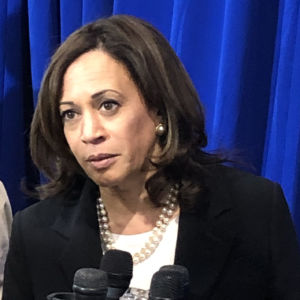California Sen. Kamala Harris’s campaign is laying off staff and re-deploying resources for an “all in” Iowa strategy at the expense of other early states like New Hampshire, but the campaign insists the move is not a sign of desperation. Instead, they point to previous campaigns like John Kerry in 2004 or John McCain in 2008 that, they argue, made similar tough choices and went on to win.
Veterans of those campaigns don’t agree.
Harris’s Granite State staff and supporters were stunned by news Wednesday that she is laying off some campaign employees and moving others to Iowa in an effort to re-ignite her flagging presidential campaign, in yet another sign that New Hampshire is not part of her strategy.
“Her New Hampshire team is genuinely in shock,” a Democratic source close to the campaign told NHJournal “They had an all-staff call about it, and then people were fired.”
The Harris campaign worked hard to push back against assumptions that their re-trenching is a setback, but Harris supporters in the Granite State told NHJournal the move was “disheartening.”
Others, like NH state Rep. Linda Tanner, took a more pragmatic view. “Look, she has to do well in Iowa and she’s making a strategic decision. I’m a little disappointed she isn’t going to spend more time here, but I’m still with her,” Tanner said. “She’s still my girl!”
That’s the response the Harris campaign is hoping for. Campaign spokesperson Lily Adams made the case Wednesday via Twitter: “Campaigns are about tough choices and this one is no different. Kamala & this team launched with 1 goal in mind: win the nomination & take on Trump. It wasn’t to just participate. We’re going to make the hard choices necessary to put us in a place to achieve that goal.”
That means going “all-in in Iowa,” as the campaign puts it, at the expense of states like New Hampshire, Nevada and her home state of California where Harris is in single digits in the RealClearPolitics poll average. Then again, she’s currently polling below 3 percent in Iowa as well.
While Harris has a trip planned to New Hampshire next week to file her paperwork for the “First In The Nation” primary, she’s spent comparatively little time in the state, and many Democratic activists have long suspected she didn’t plan to make a serious play here. According to data compiled by New England Cable News, Harris has made fewer stops in New Hampshire than any other major candidate — 18 — and far fewer than frontrunners like Sen. Bernie Sanders (42) and Elizabeth Warren (45).
Last February, when New Hampshire Democrats were knocking her campaign for spending so little time in a state that expects retail politics, Harris said, “I intend to compete for the votes here, and I’m going to put a lot of effort into doing that. It’s an important state. It is a state of people who have a lot of needs and need to be seen and heard.” Today, her campaign indicted she’ll be camped out in Iowa until their February caucus.
Will it work?
“It’s worked before,” New Hampshire Democratic chairman Ray Buckley told NHJournal, though he declined to elaborate. But Harris’s campaign manager Juan Rodriguez pointed to two previous candidacies who re-trenched early before going on to success.
“Plenty of winning primary campaigns, like John Kerry’s in 2004 and John McCain’s in 2008, have had to make tough choices on their way to the nomination,” he wrote in the memo to staff. “This is no different.”
“It’s very different,” veteran campaign manager Bob Shrum told NHJournal. Shrum was a consultant on Kerry’s campaign and said there are two key differences between Harris and the 2004 nominee. “First, Kerry didn’t have to fire people. He took out a mortgage on his Beacon Hill home and had the personal resources to keep the campaign going. Second, Kerry had a message. It was the ‘real deal’ campaign, that he was the one candidate in the race who could seriously challenge George W. Bush.”
Republican strategist Mike Dennehy, who worked on McCain’s New Hampshire campaigns in 2000 and 2008, says there is no comparison between the two. “McCain had won the 2000 New Hampshire primary and the voters knew him. Plus, he didn’t scale back due to lack of support, it was because his team made some mistakes and hired way too many people in too many states way too early.
“Harris started with nothing and still has nothing. She is doomed to failure,” Dennehy said.
Shrum isn’t as negative about Harris’s candidacy, but he does believe she hasn’t put together the messaging she needs to win. Being an attorney general who prosecutes a case isn’t the same as being a president who leads a nation.
“So far, she’s been very good at asking questions, but not as good at answering them,” Shrum said.
And what will this new strategy mean for Harris in New Hampshire? Dante Scala, a professor in the UNH predicts it will be greeted “with a shrug.”
“It’s been clear for some time that the Granite State was not important to her nomination strategy,” he told NHJournal. “This week’s UNH poll showed that primary voters had already cooled on her candidacy.”

